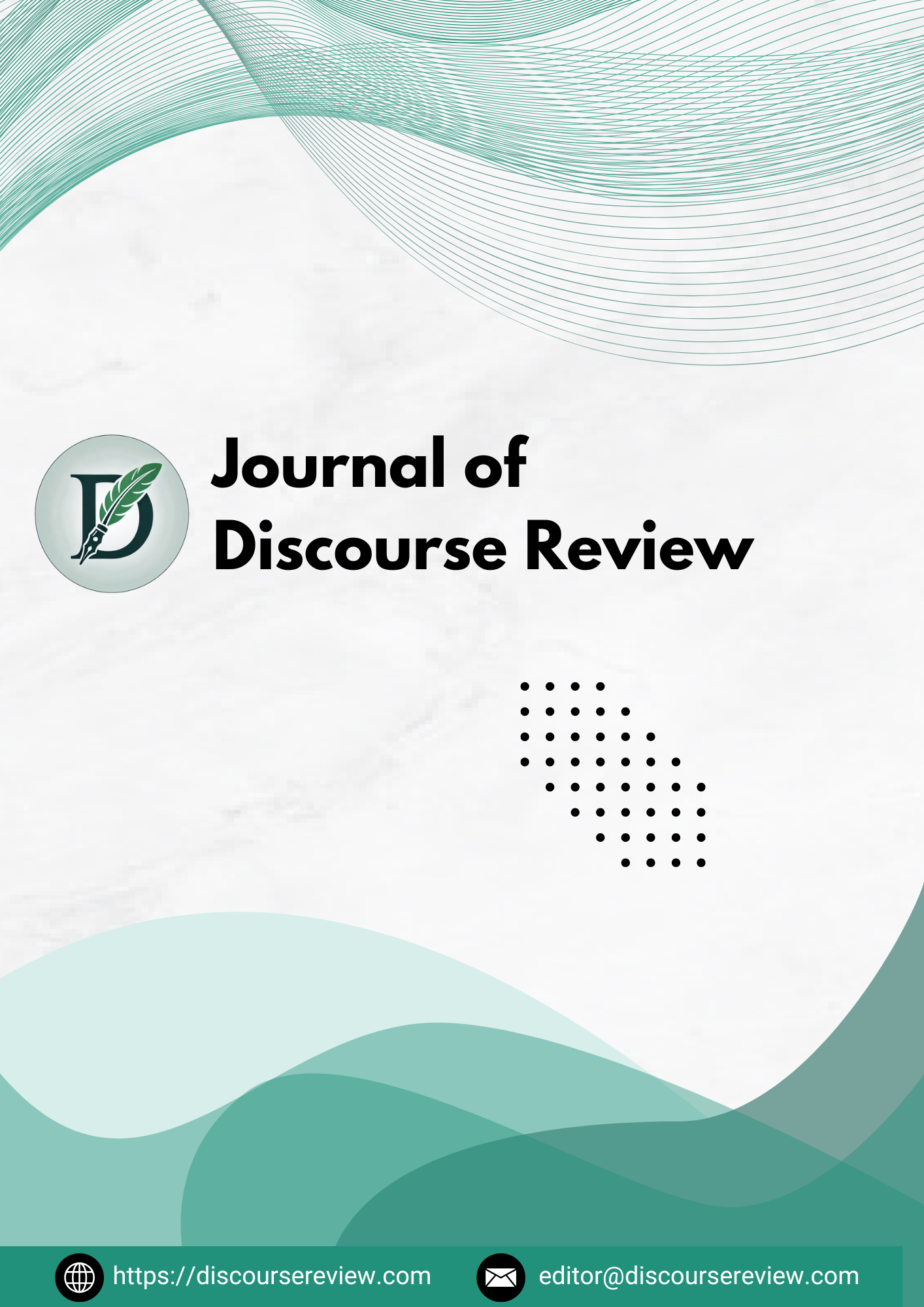
Journal of Discourse Review
Open Access Humanitarian Scholarship
7 days
Time to first decision

Open Access Humanitarian Scholarship
Time to first decision
Volume: 1 Issue: 1
Year: 2025, Page: 56-64,
Received: Feb. 17, 2025 Accepted: April 1, 2025 Published: April 22, 2025
This paper explores discourse as both a concept and a methodological tool across various academic disciplines. It explores the theoretical underpinnings and evolving definitions of discourse, highlighting its interdisciplinary nature and post-structuralist roots. The study distinguishes discourse from other linguistic units such as sentence, text, and utterance, emphasizing its focus on language in use rather than language as an abstract system. It further outlines the two major approaches to discourse—formal and functional—highlighting the centrality of context in discourse analysis. Drawing on definitions from linguists and dictionaries, the paper shows how the term discourse has acquired diverse meanings across disciplines like linguistics, sociology, philosophy, feminism, and post-colonial studies. The paper argues that despite this diversity, discourse analysis is unified by its commitment to investigating real, naturally occurring language beyond the sentence level. The paper concludes that discourse analysis enhances our understanding of language by integrating linguistic and extra-linguistic elements, offering practical insights into how language operates in social, cultural, and ideological contexts.
Keywords: Discourse, Discourse analysis, Language in use, Context, Interdisciplinarity, Text, Utterance, Functional approach, Formal approach
Afrasiab, M., Imran, S., & Hassan, S. S. U. (2025). The Language of Social Media: A Critical Discourse Analysis
of Online Debates. Social Science Review Archives, 3(2), 01-16. https://doi.org/10.70670/sra.v3i2.526
Chapman, S., & Routledge, C. (Eds.). (2009). Key Ideas in Linguistics and the Philosophy of Language.
Edinburgh: Edinburgh University Press.
Coulthard, M., & Brazil, D. (1992). Exchange Structure. In M. Coulthard (Ed.), Advances in Spoken Discourse
Analysis.
Fairclough, N. (1989). Language and Power. London: Longman.
Fairclough, N. (1992). Discourse and Social Change. Polity Press: Cambridge
Fairclough, N. (1995). Critical Discourse Analysis. London: Longman.
Fairclough, N. (1996). A reply to Henry Widdowson’s ‘Discourse Analysis: a critical view’. Language and
Literature, 5(1), 49-56.
Fairclough, N. (2013). Critical discourse analysis: The critical study of language (2nd ed.). Routledge.
Figueroa, E. (1994). Sociolinguistic Metatheory. Oxford: Pergamon.
Gee, J. P. (2018). Introducing discourse analysis: From grammar to society (3rd ed.). Routledge.
Gumperz, J.J. (1999). Communicative Competence. In N. Coupland & A. Jaworski (Eds.), Sociolinguistics: A
Reader and Coursebook (pp. 39-48). London: Macmillan.
Halliday, M.A.K. (1961). Categories of the theory of grammar. Word, 17(3), 242–92.
Harris, Z. S. (1952). Discourse analysis. Language, 28(1), 1–30. https://doi.org/10.2307/409987
Hartmann, R. R. K., & Stork, F. C. (1972). Dictionary of language and linguistics. London: Applied Science
Publishers.
Hymes, D.H. (1972). On communicative competence. In J.B. Pride, & J. Holmes (Eds.), Sociolinguistics (pp. 269-
293). London: Penguin.
Hymes, D.H. (1999). The Scope of Sociolinguistics. In N. Coupland, & A. Jaworski (Eds.), Sociolinguistics: A
Reader and Coursebook (pp. 12-22). London: Macmillan.
Johnson, C. D., & Patel, R. (2024). Hybrid communication: Language, technology, and culture. Discourse and
Society, 35(2), 150–172.
Longman dictionary of contemporary English. (2001). (3rd Ed.). Person Education Limited, Longman.
McArthur, T. (1996). The Oxford companion to the English language. Oxford University
McCarthy, M. (1991). Discourse analysis for language teachers. Cambridge: Cambridge
Megantari, K., Nugroho, H., & Arymami, D. (2025). Revealing The Indonesian Crazy Rich Prisoner on SocialMedia: A Multimodal Discourse Analysis. Qualitative Report, 30(3).
Microsoft Encarta. (2007). Discourse. Redmond, WA: Microsoft Corporation.
Mills, S. (1997). Discourse. London/ New York: Routledge. Press.
Schiffrin, D. (1994). Approaches to discourse. Oxford: Blackwell.
Smith, A. B. (2024). Digital discourse and social transformation. Journal of Communication Studies, 56(1), 45–67. University Press.
Widdowson, H. (1995a.) Discourse analysis: a critical view. Language and Literature, 4(3), 157-72.
Widdowson, H. (1995b). Review of Fairclough, Discourse and Social Change’ Applied Linguistics, 16(4), 510-16.
Widdowson, H. (1996.) Reply to Fairclough. Discourse and interpretation: Conjectures and refutations. Language
and Literature, 5(1), 57–69.
Widdowson, H. (1998). The Theory and Practice of Critical Discourse Analysis. Applied Linguistics, 19(1), 136–151.
Widdowson, H. G. (1996). Linguistics. Oxford University Press.
Widdowson, H.G. (1973). An applied linguistic approach to discourse analysis. Widdowson, H. G. (1973). An applied linguistic approach to discourse analysis (Unpublished doctoral dissertation). Department of Applied Linguistics, University of Edinburgh.
Yule, G. (1985). The Study of language: An introduction. Cambridge University Press
© 2025 JDR Academic Trust. This is an open-access publication distributed under the terms of the Creative Commons Attribution 4.0 International License (CC BY 4.0). https://creativecommons.org/licenses/by/4.0/
Hashmi, S. G. (2025). Discourse: Methods and Approaches in Research Analysis. Journal of Discourse Review, 1(1), 56-64.